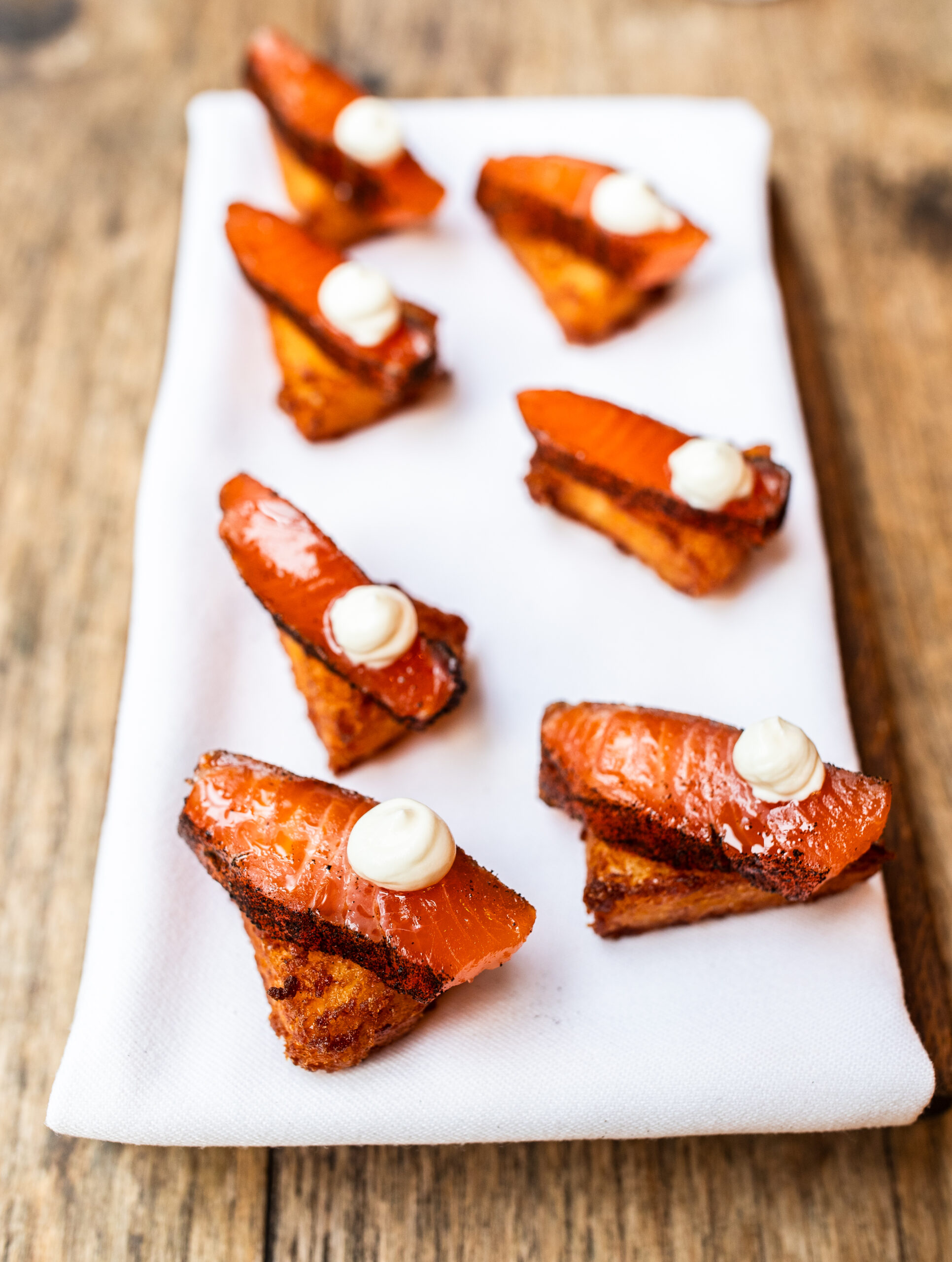
Chalk Street Trout Gravadlax: A Chef’s Take on a Classic Scandinavian Dish
Chalk Street Trout Gravadlax is a modern twist on a centuries-old Scandinavian delicacy. Known for its fresh, vibrant flavours. traditionally involves curing salmon in a mixture of salt, sugar, and dill. The recipe originates from the Nordic countries, where fishermen used to preserve fish by burying it in the sand above the high-tide line.
At Chalk Street, this classic recipe has been reimagined using locally sourced trout, giving the dish a fresh, sustainable twist. The delicate curing process, combined with premium Chalk Street Trout, ensures that the flavours of the fish shine through while maintaining the buttery, melt-in-your-mouth texture that makes gravadlax so beloved.
What Makes Chalk Street Trout Gravadlax Special?
The key to this dish lies in the quality of the ingredients and the careful balance of flavours. Trout, often considered a more sustainable choice compared to salmon, brings a slightly milder flavour, which pairs beautifully with the traditional cure of salt and sugar. What sets the Chalk Street version apart is the addition of unique elements such as zesty citrus or earthy spices that infuse the fish with layers of complexity.
How to Prepare Chalk Street Trout Gravadlax at Home
If you’re looking for a show-stopping dish to make at home, Chalk Street Trout Gravadlax is an excellent choice. While it may seem like a gourmet dish, the process is surprisingly straightforward. All you need is fresh trout, a curing mixture of salt, sugar, and your choice of herbs and spices, and a bit of patience. The fish is left to cure in the refrigerator for up to 48 hours, during which time the flavors meld together, and the trout transforms into a delicately flavoured treat.
Why Chalk Street Trout Gravadlax is Perfect for Home Cooks
One of the reasons gravadlax has remained popular over the years is its simplicity and elegance. With minimal cooking involved, it’s perfect for home cooks who want to create something special without spending hours in the kitchen.
Chalk Street Trout Gravadlax: A Healthy, Delicious Choice
Not only is Chalk Street Trout Gravadlax delicious, but it’s also a healthy option. Trout is rich in omega-3 fatty acids, high in protein, and low in calories, making it an excellent choice for anyone looking to enjoy a nutritious meal without sacrificing flavour.
Conclusion
Chalk Street Trout Gravadlax is a dish that brings together the best of tradition and modern cooking techniques. With its roots in Scandinavian cuisine and a focus on fresh, sustainable ingredients, this recipe is a must-try for any home cook looking to elevate their culinary skills. By following the expert guidance of chefs, you can easily recreate this stunning dish at home and enjoy the fresh, delicate flavors of Chalk Street Trout Gravadlax.
PrintChalk Stream Trout Gravadlax
- Author: Fallow
- Prep Time: 10 minutes
- Cook Time: 1 hour and 10 minutes
- Total Time: 1 hour and 20 minutes
Ingredients
- Chalk Stream Trout
- Fish Cure:
- 4 heaped tablespoons coriander seeds
- Earl Grey leaves
- 240g Maldon salt
- 160g caster sugar
- 2 lemons – zest only
- 2 limes – zest only
- Hash Brown Rosti:
- 200g (peeled weight) Agria Potato
- 35g (peeled weight) Onions
- 75g Clarified Butter
- Potato Seasoning mix: 1 tsp Tapioca Starch, 1/2 tsp Onion Powder, 1/2 tsp Fine Salt
Instructions
Trout
- Fish Cure: gently toast the coriander seeds and Earl Grey leaves in a dry pan until they become fragrant, cool slightly. In a blender, spice grinder or with a pestle and mortar, roughly crush and tip into a mixing bowl with the zests, sugar and Maldon salt and mix together.
- Fillet the trout and remove skin by gliding a filleting knife along the back of fish.
- Lay a piece of baking parchment on your work surface (enough to wrap your trout), sprinkling a layer of the curing salt on top the parchment. Place one fillet on top of the salt mix then cover with another layer of the curing salt. Wrap the trout tightly in parchment and move to the fridge to cure for at 2.5 – 3 hours.
- Optional – if you have a spice grinder, powder another couple of table spoons of toasted tea leaves and set aside in a flour shaker for dusting later. A tea strainer of small sieve will also work.
Hash browns
- Using the fine julienne or grater attachment on your food processor, grate the potatoes and onions. Wash 4 times back and forth in a large bowl using clean water each time. Drain and set aside.
- Squeeze out excess moisture from the grated potatoes with a clean cloth.
- Heat the clarified butter in a heavy pan and stir in the grated potato with a good pinch of salt. Set the heat to very low and put the lid on to cook for 15-20 minutes, stirring carefully every 5 minutes.
- Drain through a sieve to remove excess butter. Tip the potato mix onto a tray to cool.
- Mix together the seasoning ingredients and add to the potato, mixing well.
- Set your ring moulds out (we used 8cm diameter moulds) on a flat baking sheet or tray, lined with baking parchment. Grease the insides of the moulds with oil. Fill the moulds to just higher than the top and level off the mixture neatly with a knife or spatula. Place another sheet on top of the rings, weight and refrigerate for at least 1 hour.
To assemble
- At the end of the curing time, thoroughly rinse the curing salt from the trout in plenty of cold water.
- Slice trout in half lengthways. Then slice each half into about 1 cm slice strips (place in fridge to keep cool).
- Heat the vegetable oil in a pan to 170 degrees c.
- Carefully remove the hash browns from the moulds. Slice into 8 triangles then each wedge in half again crosswise (in total 16 wedges). Fry the wedges for 3-4 minutes, until golden brown, turning half way through. Place wedges on kitchen tissue and season with a generous sprinkle of salt and black pepper.
- Assemble Gravadlax by placing slice cured trout on top of the potato wedges, finishing with a squeeze of lemon juice and a dollop of crème fraîche.
